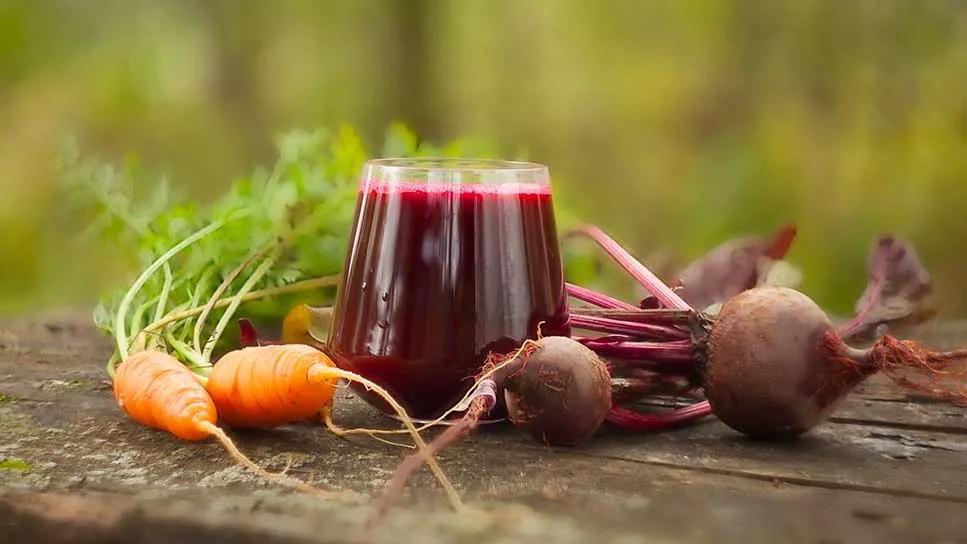While not magic elixirs, some drinks like beet juice and skim milk may help keep numbers down

Image content: This image is available to view online.
View image online (https://assets.clevelandclinic.org/transform/289c0b3a-2281-48eb-97be-d8b5a0a41a77/Juices-Lowering-Blood-Pressure-615627294967x544-1_jpg)
beet and carrot juice in a glass surrounded by beets and carrots
High blood pressure (BP) can be deadly — a chilling reality for more than a billion people around the world who live with the condition. So, wouldn’t it be nice if you could lower your BP by just sipping on the right drink?
Advertisement
Cleveland Clinic is a non-profit academic medical center. Advertising on our site helps support our mission. We do not endorse non-Cleveland Clinic products or services. Policy
Unfortunately, it’s not that easy. No magic tonic reverses high blood pressure (hypertension) sip by sip. The cause of high BP is much too complex to be resolved with a quick pour.
But what’s in your cup could nudge your blood pressure down or drive it up. So, what’s a healthy choice for a beverage? Let’s quench that thirst for knowledge with cardiologist Luke Laffin, MD.
High blood pressure isn’t caused by ONE thing in your life. Typically, a multitude of factors — usually including diet, physical activity and genetics — combine in some way to push BP numbers into the danger zone.
Adjusting what you eat and drink can help you naturally shift your BP into a healthy range. The DASH diet (which stands for Dietary Approaches to Stop Hypertension) is a good starting point for what to put on your plate.
But here’s what you might want to consider to wash down those good eats.
When it comes to popularity contests, beets (or beetroot) don’t fare all that well. A few years ago in fact, an online poll identified the blood-red root vegetable as the second least favorite vegetable in America.
Hmm … maybe that’s part of the reason why high BP is such a problem?
Research shows that dietary nitrates in beets offer anti-inflammatory benefits that can contribute to lower blood pressure. Nitrates help open (or dilate) blood vessels to reduce the pressure needed to pump blood through your body.
Advertisement
“There is some data behind the idea that beets might lower blood pressure,” says Dr. Laffin. “But if it does help, it’ll just be a little bit.”
It’s no secret that excess sodium in your diet can boost your blood pressure. But did you know that adding potassium to your diet can knock your BP down a few notches by lowering sodium levels?
Potassium works with your kidneys to excrete sodium and give it the heave-ho from your system. The nutrient also improves your overall vascular health to help blood flow more easily.
“Adding potassium to your diet tends to decrease blood pressure,” shares Dr. Laffin. (To put a number to it, getting the recommended amount of potassium in your diet can lower your BP by roughly 4 to 5 mmHg.)
Juices high in potassium include:
Although grapefruit juice is high in potassium, caution is advised. Grapefruit juice can interact poorly with some blood pressure medications. Talk to your healthcare provider before considering it.
Overall, look for 100% juice and try to avoid products with added sugars. Don’t go overboard on chugging juice, either: Even though it’s high in vitamins and nutrients, it’s also loaded with calories and natural sugar.
In addition, watch your potassium consumption if you have kidney disease, as your kidneys may struggle to process the nutrient. Kidney disease is often a byproduct of high blood pressure.
Low-fat dairy is a key part of the DASH diet — and skim milk qualifies.
Researchers found that consumption of low-fat dairy may help lower BP. The potassium in milk is one reason. High levels of vitamin D, phosphorous and calcium in milk also may impact blood pressure.
Brewing and sipping a cup of tea is relaxing. It’s the sort of activity that can melt away stress that sends blood pressure levels soaring.
But that’s just the start. Many teas also contain compounds that reduce inflammation and keep blood vessels open and flexible. Given that, it’s easy to see why the beverage is a go-to choice for lowering BP.
Hibiscus tea generally gets top marks for its work on BP. Ditto for chamomile tea.
While there’s no drink guaranteed to lower blood pressure, downing glasses of beverages in these four categories will almost certainly drive your BP up:
Advertisement
If your blood pressure runs a tad high, the fact that you’re looking up ways to lower it is a good sign. Changing what you pour into a glass can be a small part of your process to bring down your BP.
What else can you do? For starters, you can:
“Small changes to your routine can make a big difference,” encourages Dr. Laffin. “Every little bit helps.”
Even what you drink.
Advertisement

Delivered every Tuesday!
Sign up for our Health Essentials emails for expert guidance on nutrition, fitness, sleep, skin care and more
It's a letter about the news!

Every two weeks once
Sign up for our Health Essentials emails for expert guidance on nutrition, fitness, sleep, skin care and more.
Learn more about our editorial process.
Advertisement
Fatigue is more likely caused by low blood pressure or another condition
And if yours has been a little higher, learn how to get it under control
Advice for resistant hypertension
Too much vitamin D can create heart health hazards
How specialists tackle stubborn hypertension
Study finds more people have chronic hypertension, even before they’re pregnant
Maintaining normal blood pressure should be your goal
Tips for taking and tracking accurate blood pressure measurements
Type 2 diabetes isn’t inevitable with these dietary changes
Applying a hot or cold compress can help with pain
Pump up your iron intake with foods like tuna, tofu and turkey